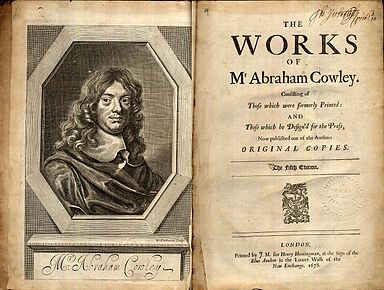Nous avons le plaisir de vous inviter au prochain séminaire de l’Axe Modernités 16 – 18 sur « Poétiques et politique de l’arbre à la première modernité » qui se tiendra le LUNDI 3 AVRIL prochain à la maison de la recherche (28 rue Serpente, 75006 Paris), de 14 h 00 à 16 h 00 en Amphi Molinié.
Nous y entendrons les deux interventions suivantes:
Keith Pluymers (Illinois State University), “Imperial Visions and Colonial Omission in John Evelyn’s Sylva, or A Discourse of Forest-Trees and the Propagation of Timber in His Majesty’s Dominions (1662)” (à distance)
Et
Victoria Moul (University College London), “Cowley’s trees: assessing style, genre and tone in seventeenth century Latin poetry” (en personne)
(Discutant: Alexis Tadié)
Le lien zoom peut être fourni sur demande.
En espérant vous y retrouver nombreux,
Bien cordialement,
Line Cottegnies, Anne-valérie Dulac et Alexis Tadié
Keith Pluymers
Bio: Keith Pluymers is Assistant Professor of History at Illinois State University in Normal, Illinois. He completed his PhD in 2015 at the University of Southern California and was a postdoctoral instructor at Caltech prior to joining ISU. His first book, No Wood, No Kingdom: Political Ecology in the English Atlantic came out with the University of Pennsylvania Press in 2021 and has won the John Ben Snow Prize for best book on British history prior to 1800 from the North American Conference on British Studies. He is currently working on a book project titled “Water, Steam, and Philadelphia’s Eighteenth-Century Anthropocene” that examines the development of Philadelphia’s municipal water system in the long eighteenth century and the climate and environmental histories that shaped it.
Abstract: In the first two editions of his In the first two editions of Sylva (1664 and 1670) John Evelyn described himself as the first person to think systematically about England’s forests and trees at a moment of scarcity and crisis. This, however, was a self-conscious promotional flourish—Evelyn had seen and engaged with robust discussions about woods and trees in England and its colonies in the years prior to publication—but it allowed him to approach imperial expansion and the management of woods as a new question facing England, rather than one to which there were several ongoing answers. Evelyn’s inclusions and omissions around colonial forestry and timber projects were essential to his imperial political ecology—one in which colonies were luxuries rather than necessities.
Victoria Moul
Bio: Victoria Moul is Reader in Early Modern Latin and English at University College London. She has published widely on classical, early modern and modern poetry in English and Latin, with particular expertise in the bilingual literary culture of early modernity. Her most recent book in this field is A Literary History of Latin and English Poetry: Bilingual Literary Culture in Early Modern England, published last year by Cambridge University Press.
Abstract: Abraham Cowley’s Plantarum Libri Sex, the ’Six Books of Plants’, published in its final form in 1668, shortly after Cowley’s death, was by far his most ambitious work but is today by far the least read. Containing, among many other topics, discussions of the best forms of government, the plants of the New World, the superiority of America over Europe and the ethics of abortion, all delivered by personified plants, it is a remarkable work by any measure. Its length, Latinity and sheer strangeness, however, have largely excluded it from serious critical consideration. This paper will use the last two books, on trees, to consider how we can approach and make sense of large-scale Latin poetry of this period, with particular attention to the central literary criteria of style, genre and tone.



